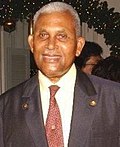13 September 1976 | |||||||||||||||||||||||||||||||||||||||||||||||||
All 36 seats in the House of Representatives 19 seats needed for a majority | |||||||||||||||||||||||||||||||||||||||||||||||||
|---|---|---|---|---|---|---|---|---|---|---|---|---|---|---|---|---|---|---|---|---|---|---|---|---|---|---|---|---|---|---|---|---|---|---|---|---|---|---|---|---|---|---|---|---|---|---|---|---|---|
| Turnout | 55.8 ( | ||||||||||||||||||||||||||||||||||||||||||||||||
| |||||||||||||||||||||||||||||||||||||||||||||||||
 | |||||||||||||||||||||||||||||||||||||||||||||||||
| |||||||||||||||||||||||||||||||||||||||||||||||||
General elections were held in Trinidad and Tobago on 13 September 1976. [1] The result was a victory for the People's National Movement, which won 24 of the 36 seats. Voter turnout was 55.8%. [2]


